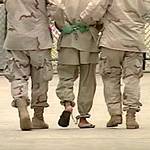2007年VOA标准英语-US Lawmakers Debate Closure of Guantanamo Facil
搜索关注在线英语听力室公众号:tingroom,领取免费英语资料大礼包。
(单词翻译)
By Dan RobinsonWashington
29 March 2007
Arguments for and against the closure of the U.S. facility at Guantanamo Bay, Cuba used for the interrogation and detention1 of suspected terrorists and trials by military commissions, were heard across Capitol Hill Thursday. VOA's Dan Robinson reports, proponents2 argued that the facility damages the U.S. image around the world, while others asserted it is a vital part of the war on terrorism.

A detainee at Guantanamo Bay, Cuba being escorted by two U.S. soldiers
Debate over Guantanamo has raged ever since the United States began transporting Taleban and suspected al-Qaida fighters from Afghanistan to the facility in the wake of the September 11, 2001 terrorist attacks on the United States. Controversy3 escalated4 after the revelation of abuses by some U.S. military personnel and contractors5 at the Abu-Ghraib prison in Iraq, as well as at Guantanamo.
Lawmakers seeking Guantanamo's closure face a dilemma6. They want to ensure that self-confessed terrorists, such as September 11 plotter Kalid Sheik Mohamed, are secured but worry about damage done to the U.S. image and its credibility as an upholder of justice and human rights.
Virginia Democrat7 Jim Moran spoke8 at a hearing of the House Defense9 Subcommittee considering the Pentagon budget. "It is eroding10 our own credibility, the reputation we seek to establish and sustain in terms of what we are there for, what we represent, the founding principles of habeus corpus and the like," he said.
The question of closing Guantanamo, as well as debate over the Military Commissions Act, passed by Congress in 2006 to establish a legal framework for military trials, were also subjects of a hearing of the House Armed Services Committee.
Congressman11 Ike Skelton says there is no doubt Guantanamo has undermined the moral authority of the United States and its ability to rally support for its policies. But any decision about closing the facility, he asserts, needs to be considered carefully.
"There is a core group of hardened terrorists who must be detained, tried and confined for a long time. Determining where we lock up these hard core detainees for a long time so they cannot return to the battlefield is the question before us."
Patrick Philbin, a former deputy associate attorney general, argues that transferring Guantanamo detainees to the United States would not only create security risks, but would do little to quiet international criticism. "International criticism does not depend primarily on the place where enemy combatants are detained. Instead, it rejects the fundamental legal paradigm12 under which the U.S. asserts the right to detain individuals as enemy combatants, and hence without charge, in an armed conflict with al-Qaida," he said.
Neal Katyal, professor of law at Georgetown University, was a lawyer for Salim Ahmed Hamdan, a Yemeni whose case challenging his detention at Guantanamo led to a 2006 Supreme13 Court ruling striking down Bush administration plans at the time for military tribunals.
If the administration is so certain military commission trials will be fair, he says, they should be moved to the United States. "And have the type of orderly review that this nation has always had, up to the Supreme Court, let's test that, let's see if these things are really fair. Let's not have these trials in a place the administration says is a legal black hole, in which people are going to be convicted, and these convictions are ultimately going to have to be undone," he said.
Elisa Massimino, Director of the Washington, D.C. office of Human Rights First, says U.S. detainee policies generally have not helped the U.S. in the war on terrorism. "The policy at Guantanamo, which treats terrorists as combatants in a war against the U.S., but rejects application of the laws of war, has had the doubly pernicious effects of degrading the laws of war while conferring on suspected terrorists the elevated status of combatants," he said.
William Taft, a former legal adviser14 at the Department of State, says an impression remains15 abroad that the U.S. set up the Guantanamo detention facility to deprive detainees of rights they would otherwise have. "Logistically, I imagine Guantanamo still has a number of advantages over other options. It seems doubtful however that these outweigh16 the political costs of continuing its operation," he said.
In a separate hearing, former State Department human rights official, John Shattuck, called Guantanamo one of three "black eyes" for the United States along with the issue of torture, and the stripping of detainee rights. "The U.S. should not be known as a country that tolerates torture, and the U.S. should not be known as a country that does not permit detainees access to the courts," he said.
Secretary of Defense Robert Gates reiterated17 to lawmakers Thursday his view that a way should be found to close Guantanamo.
But he also stressed that any closure should not result in the release of detainees who pose a threat. "There are some people down there that if we release them, have made very clear that they will come back and attack this country. So how we deal with that over the long-term frankly18 I think is a challenge that rests before both the Congress and executive branch, he said.
President Bush and other administration officials have also said they favor the eventual19 closure of the Guantanamo facility, but say this will not be easy because of as many as 70 to 80 upcoming military trials and the dangers posed by the most hard core terrorist suspects.
 收听单词发音
收听单词发音 




